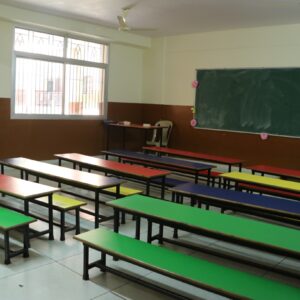Every class room is well ventilated with comfortable desks and chairs. There is a projector and smart board for e-teaching with latest knowledge of all subjects.
Class rooms are equipped with quality furniture suiting the requirements of different grade levels .
Educational researches have shown that teachers’ actions in their classrooms have twice the impact on student achievement as do school policies regarding curriculum, assessment, staff congeniality, and parental involvement. The quality of teacher-student relationships is the keystone for all other aspects of classroom management. At ST.PAUL’S SCHOOL JHINJHARI KATNI, the intuitive class management techniques ensure that each classroom is the ‘favourite haunt’ of the class second to none, not even the playground. They are many and varied but result in effective teaching and enhanced learning in the classrooms.
Rotational Seating arrangement
The students at ST.PAUL’S JHINJHARI feel a strong sense of attachment and belongingness to their class, classroom and class teacher. It is truly their ‘home away from home.’ This is because the classroom is owned by them in the best possible way.
- They are responsible for the furniture and boards.
- There are neither ‘backbenchers’ nor ‘front-ups’ in St.Paul’s School.
- Students are seated according to a rotational system which makes each one sit in the front as well at the back.
- No child is made to feel sidelined or ignored by being made to sit in the corner or back seat.
Monitoring
- The key to this principle is that best teaching takes place when the teacher is on her feet; not on the seat.
- At ST.PAUL’S JHINJHARI, each and every teacher makes frequent rounds while the students are working to check on their progress.
- The teacher passes through the whole room about two minutes after the students have started a written assignment. She checks that each student has started and provides individualized instruction as needed.
- The students who are not yet quite on task quickly ‘get going’ while the teacher quietly yet firmly reminds the distracted learners to focus.
Modeling
Teachers are role models for their students and by being courteous, prompt, enthusiastic, in control, patient and organized they provide live examples for their students to develop good habits and acquire values through their own behaviour.
Responsibility
Every child wants to be a monitor and does in ST.PAUL’S SCHOOL JHINJHARI. Lurking behind a talkative child can be an organized mind; an ‘always upto some mischief’ child becomes an exemplary discipline incharge.Each and every child is given some role or responsibility turnwise throughout the session. The purpose is manifold:
-
- Build leadership capabilities
- Develop self-esteem and self-confidence
- Motivate the so called naughty students or weak learners
- Practice through action the value of Equality and ‘First among equals’
- Allow each and every child to shoulder responsibility and learn accountability
Environmental Control
- Students enjoy an environment that changes frequently and that is why they are drawn like magnets to a needle to their cheery classrooms which affords them personal space and physical space, visually appealing interiors and personalized environment.
- Students decorate their class soft boards (inside and outside the classroom) with their creative expressions.
- Often on annual observances like ‘Earth Day’ or ‘World environment Day’, they are allowed to do theme-based stain painting on a class window.
- Festivals and celebrations acquire special meaning as they put up a Christmas tree; draw a rangoli design or hang festive festooning.
- They are allowed to sit in groups or semicircles for various class activities.
Positive Discipline
- Instead of a steady stream of ‘Nos’ and ‘Don’ts’, the students have the liberty to draw up their own list of classroom rules, in consultation with their class teacher. The whole class is involved in framing ‘their own class rules’ and more importantly, ensuring their compliance.
- Positive affirmation and ample praise are a staple fix of every class; every class soft board has a student performance chart in which the stars they earn are entered by the teachers.
Special badges or medals like ‘Best Disciplined Class’ is awarded.
Standard and Non-conflicting Instructions
Students also take certain things for granted and of course standard instructions if prominently displayed come handy to the newcomers among students and teachers as well. Also, these guidelines ensure that no conflict arises in terms of test dates or home assignment dates even among the different teachers coming into a class. Every classroom has a soft board and white board with explicit instructions put up daily on them.
-
-
- Date, class strength, number of absentees
- Word of the day and its meaning
- Route/Walker list
- Lord’s Prayer and Dispersal Prayer
- Time table and Home Work schedule
- Bell Timings
-

